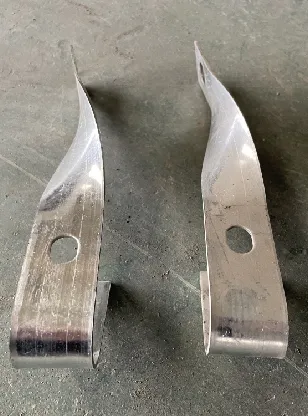loading...
- No. 9, Xingyuan South Street, Dongwaihuan Road, Zaoqiang County, Hengshui, Hebei, China
- admin@zjcomposites.com
- +86 15097380338
- Welcome to visit our website!
FRP Pressure Vessel Filtration Systems for Efficient Liquid Processing
Understanding FRP Pressure Vessel Filters Applications and Benefits
Fiber Reinforced Polymer (FRP) pressure vessel filters have emerged as an essential component in various industries, including water treatment, chemical processing, and oil and gas production. These filters combine the strength and durability of pressure vessels with the lightweight and corrosion-resistant properties of FRP materials. In this article, we will delve into the functionality, applications, and advantages of FRP pressure vessel filters.
What Are FRP Pressure Vessel Filters?
FRP pressure vessel filters are designed to house filtration systems, where they can operate efficiently under high pressure and varying temperature conditions. These vessels are constructed using a composite material made of polymer resins reinforced with fiberglass, resulting in a product that offers superior strength while being significantly lighter than traditional materials like steel. The construction process involves winding fiberglass around a core or mold, followed by application of a resin to form a solid, durable structure.
Applications of FRP Pressure Vessel Filters
1. Water and Wastewater Treatment One of the primary applications of FRP pressure vessel filters is in municipal and industrial water treatment facilities. These filters are used to remove impurities, sediment, and other contaminants from water supplies, ensuring clean and safe water for consumption and industrial processes.
2. Chemical Processing In the chemical industry, FRP pressure vessels are utilized for filtering various chemicals, acids, and solvents. Their corrosion-resistant properties make them ideal for handling aggressive substances, reducing the risk of contamination and equipment degradation.
3. Oil and Gas Industry FRP pressure filters are increasingly used in the oil and gas sector for separating water from crude oil, ensuring a more efficient extraction process. Their lightweight nature allows for easier transport and installation in remote locations, contributing to operational efficiency.
4. Food and Beverage Industry Ensuring product purity is crucial in the food and beverage industry. FRP pressure vessel filters play a significant role in filtering liquids to meet health and safety standards, thereby protecting consumers and maintaining quality.
frp pressure vessel filter

5. Aquaculture and Marine Applications In aquaculture, FRP pressure filters help maintain water quality in fish farming operations by filtering out waste products and harmful pollutants, ensuring a healthier environment for aquatic life.
Advantages of FRP Pressure Vessel Filters
1. Corrosion Resistance One of the standout features of FRP materials is their exceptional resistance to corrosion. Unlike metal vessels that can rust or degrade over time, FRP filters maintain their integrity even in harsh chemical environments.
2. Lightweight Construction FRP pressure vessels are significantly lighter than traditional metal vessels, making them easier to handle, install, and transport. This can lead to reduced labor costs and improved logistics.
3. Strength and Durability FRP materials provide similar strength characteristics to steel but are less susceptible to dents and scratches. This durability extends the lifespan of the pressure vessel filters, making them a more cost-effective solution over time.
4. Cost Efficiency Although the initial investment may be higher compared to conventional materials, the long-term savings associated with reduced maintenance, replacement costs, and operational efficiency make FRP pressure vessel filters a wise investment.
5. Customization FRP technology allows for significant customization in the design of pressure vessels. This means that the size, shape, and specific filtration requirements can be tailored to meet the unique needs of different applications.
Conclusion
FRP pressure vessel filters represent a significant advancement in filtration technology across various industries. Their unique combination of lightweight construction, corrosion resistance, and durability provides a compelling case for their adoption. As technology continues to evolve, so too will the applications of FRP materials, potentially opening new avenues for energy efficiency and environmental sustainability in filtration operations. For industries looking to improve their filtration processes, investing in FRP pressure vessel filters may be a strategic decision that supports both operational excellence and ecological responsibility.
-
The Rise of FRP Profiles: Strong, Lightweight, and Built to LastNewsJul.14,2025
-
SMC Panel Tanks: A Modern Water Storage Solution for All EnvironmentsNewsJul.14,2025
-
GRP Grating: A Modern Solution for Safe and Durable Access SystemsNewsJul.14,2025
-
Galvanized Steel Water Tanks: Durable, Reliable, and Ready for UseNewsJul.14,2025
-
FRP Mini Mesh Grating: The Safer, Smarter Flooring SolutionNewsJul.14,2025
-
Exploring FRP Vessels: Durable Solutions for Modern Fluid HandlingNewsJul.14,2025
-
GRP Structures: The Future of Lightweight, High-Performance EngineeringNewsJun.20,2025
